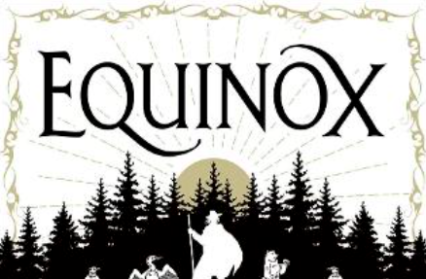Sophie Buchaillard reviews Equinox by David Towsey, a fantasy novel which plays with the conventions of the genre in a world where two souls inhabit a single body, one by day and one by night.
What do you do when your own self starts behaving suspiciously? The story of Equinox starts with a mystery. A member of the King’s Special Inspectorate in the kingdom of Reikova, Christophor Morden, is called to the city’s prison, at night, under great secrecy. The warden who receives him takes him to a prisoner, a child by the name of Gregory Harsson, a sixteen-year-old boy arrested for theft in the distant town of Drekenford. The warden won’t say anymore until Christophor has examined the traumatised boy. Inside the cell, he finds Gregory, mute, curled up in a dark corner. The child, apparently alone, has clawed his eyes out. Compelled by instinct, Christophor reaches inside the child’s empty sockets. In the holes, teeth are growing. This is when we know Equinox is not going to be a traditional mystery.
“Which of them did it?” Christophor asks the warden, back in his office. Which of them? Gregory or his day-brother Jan? For in the kingdom of Reikova, distinct existences are governed by the rising and setting of the sun. One body. Two souls. One life lived in the light and the other in darkness. With the kingdom on the verge of war, the stakes are high. Suspecting witchcraft, the sovereign deputises Christophor whom he hand-picked for his experience in such matters. A man guided by visions, yet reluctant to take on the task. Still, he journeys to the remote town of Drekenford where the boy lived, hoping to unpick the circumstances of the child’s arrest. A visit to the city cathedral has reinforced his suspicion that whoever is responsible for Gregory’s state is capable of powerful witchcraft.
In this strange world however, Christophor Morden also shares a body with his day-brother, a musician by the name of Alexsander. Alexsander who is as sociable and outgoing as Christophor is sullen. At night, the one interviews the villagers, trying to take the measure of this isolated town on the edge of a forest; whilst in the light the other entertains them by playing music at the inn. This duality raises many questions for the reader. Who committed the crime? Can the Inspector, who lives in the night, investigate without access to the day-people?
As the investigation progresses and increasingly horrific events take place, the townsfolks close rank, frightened by the presence of the two brothers, the archetypical ‘outsiders come to town’. Equinox is an original blend of genres with Christophor a sort of medieval Sherlock Holmes turned Witcher who contrasts with his bon-vivant day-brother. Each relates to different versions of the same villagers who bear distinct names, exhibit different personalities, and carry out individual trade. Some are married in the night, yet single in the day.
After a death occurs in bizarre circumstances, Christophor realises he must fold the plot of an ancient ritual; whilst in the day Alexsander continues to drink, play music, and fall in love. They each interact with different sides of a same coin, in a game of smoke and mirrors where nobody can hold all the information. You come to wonder whether Christophor will need to rely on his day-brother to identify the witch? And whether Alexsander, who has become friendly with the villagers, can in fact be trusted? When their two worlds threaten to collide and an apocalypse is looming, Christophor and Alexsander will be forced to take side.
Set in a complex upside-down world that deconstructs our perceptions of time, space and the self, Equinox is a mind-bending read that reminded me of the apocalyptic vision of Sergueï Lukianenko, the author of Night Watch and Day Watch. Towsey takes the logic to a whole new level, forcing his reader to imagine the unimaginable. Equinox is the sort of book that absorbs you whole, spitting you out the other end, feeling a little discombobulated and surprised that the world around you is no longer regimented by the consumption of the ettiene’s leaves that the characters consume to transition between day and night. Maybe it was all a drug-induced dream after all?
Yet the kingdom of Reikova, and the town of Drekenford in particular, are described with a certain fluidity that gives the reader room to draw parallels with our own timeline. As I read, I moved from evocations of rural Dutch painting scenes to nightmarish visions straight out of Dante’s Divine Comedy; or rather from scenes of peaceful rural harmony to the sort of destruction brought on by war or pollution. The way the villagers turn on the brothers is reminiscent of Arthur Miller’s play The Crucible, and like the play, it felt to me like Equinox offered a societal reflection on a world closer to our own. In fact, the cover itself presents a clin d’oeil to the people of Cardiff who will have recognised Burgess’s animals on the wall from Cardiff Castle.
Equinox blends the popular genres of murder mystery, sci-fi and horror in a way that should appeal to a broad range of readers. At the same time, Towsey also challenges us to embrace a philosophical reality where good and evil are not portrayed in the simplistic Manichean way Hollywood tends to favour, but with a deep complexity that recall Alexander Solzhenitsyn’s words: “the line dividing good and evil cuts through the heart of every human being.”
David Towsey David Towsey
Equinox by David Towsey is available now.




 Enjoyed this article? Support our writers directly by buying them a coffee and clicking this link.
Enjoyed this article? Support our writers directly by buying them a coffee and clicking this link.







